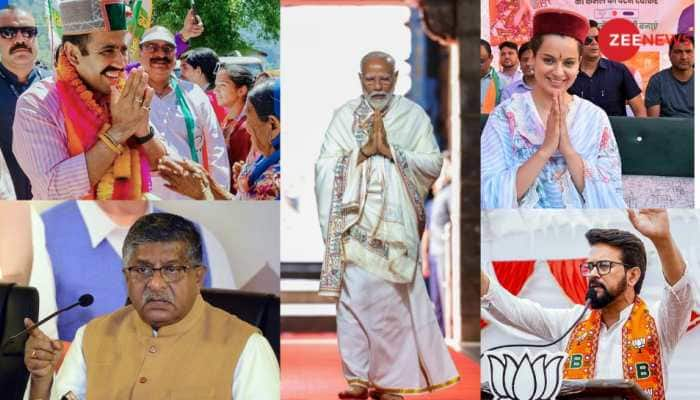Exclusive: How last mile delivery electric vehicles can help India tackle pollution?
We got in touch with Akash Gupta, Co-founder & CEO, Zypp Electric to understand last-mile delivery and electric vehicles in general.
- Last mile delivery biggest aggregator of EVs in India
- Zypp Electric leading maker of last mile delivery vehicles
- Delhi govt recently announced country's first EV policy for aggregators
Trending Photos
) Zypp fleet riders
Zypp fleet riders Every year, during winters, the pollution levels in Delhi-NCR peaks to maximum levels pushing lawmakers to ban firecrackers, use of petrol/ diesel cars among other measures. However, the permanent solution is to find an alternative and green source of energy for vehicles. This has given an impetus to electric vehicles in the country and commercial vehicles are seen as the next big revolution for EVs.
Among CVs, last-mile delivery has grown in popularity, esp in metro cities and implementing EVs for last mile delivery is seen as an immediate solution to India’s pollution problem. We got in touch with Akash Gupta, Co-founder & CEO, Zypp Electric to understand last-mile delivery and electric vehicles in general.
Also Read: Gurugram gets India’s biggest charging station with 121 chargers
How do you see last-mile delivery boosting EV sales in India?
While India’s EV market has seen multi-fold growth and adoption, the boost in EVs sales will come through the last-mile delivery segment. The reason is simple; there’s been an increase in the number of logistics and e-commerce companies committing to go electric, which has been an important driver for EV growth in India. With the new policy in place which mandates logistics and aggregators to go 100% electric by 2025, we expect more e-commerce platforms to pick up the EV momentum quite aggressively. With it, we are likely to see an uptick in EV sales in the coming years.
We feel that India isn’t ready for B2C adoption due to range anxiety and charging infrastructure problems, and building an innovative EV ecosystem that is also solving charging infrastructure challenges, will not happen immediately.
We have also witnessed a huge demand from all our partners from the last couple of quarters. In fact, we haven’t witnessed a low demand in quite a few months now. Zypp has already completed more than 3 million deliveries on EVs for its partners in this financial year.
Does last-mile delivery on EV really help reduce pollution?
Absolutely, electric vehicles play a crucial role in leading the fight against climate change. Soaring use of e-commerce and grocery deliveries have indeed offered consumer convenience. However, it has also worsened the pollution levels. A recent report by RMI India estimates that registered delivery vehicles in Delhi emitted 700,000 tons of CO2 in 2019. This has not only worsened the pollution levels but has also severely impacted the health of the residents.
I believe electric vehicles can help us address the underlying issue and meet the targets set aside by the Paris Agreement. They emit 35% less emissions than any ICE vehicle and consume 80% less energy. If India starts doing delivery through EVs, we will be preventing 1.2 Gigatons of carbon emissions, 230-kilo tons of particulate matter, and INR 60 lakh crore of fuel over the lifetime of sold until 2035. That’s precisely why we support NITI Aayog’s Shoonya campaign. I think we can create a sustainable place if we make small steps that create a big impact.
Also read: Hero Motocorp announces new EV brand 'VIDA'
What’s your take on Delhi’s aggregator policy?
Zypp Electric welcomes the Delhi government's new EV norms and is ready to be one of the enablers that help India’s capital city adopt clean mobility. Today logistics and last mile delivery contribute to the lion share of trips happening in our country and hence being on IC engine, these trips generate a lot of pollution too. With this EV move and also with a timeline to it, I believe most logistics companies or last-mile delivery services will look at partnering with EV rental platforms like Zypp to quickly go electric rather than buying a fleet of their own as it comes with its own challenges.
We’re ramping up our supplies to cater to the rising demand. Until last year, we were onboarding 500 new EVs every month onto our fleet but now we have decided to scale the number of vehicles by 4X. Starting April, we will be adding 2,000 new EVs every month. Moreover, we can expect other state governments to follow suit. Hence, companies who weren’t aggressively looking at EVs would want to go electric quickly.
What products are you offering and why are they unique?
Zypp Electric is India’s Leading Tech-Enabled EV-as-a-Service platform, founded in 2017 with a Mission Zero-Emission and to make India carbon-free. At Zypp, we are building an ecosystem of Electric Vehicles, Charging infra and EV related maintenance and service infra backed with technology to make last-mile sustainable and emission-free.
We want to make carbon-free last-mile delivery for local merchants to e-commerce giants to delivery executives and thereby reduce delivery cost and pollution on an asset-light model. We currently deliver groceries, medicines, food, e-commerce packages from point A to point B through our fully automated IoT and AI-enabled scooters which are low on maintenance and high on performance. The technology tracks batteries that can be replaced at Zypp swapping stations which are installed at key touchpoints. Eco-friendly EV services also reduce the cost per delivery and help to make the city pollution-free. We have an ordered fleet of 5000+, and are growing 30% month over month.
We also have Zypp Rental app, where any executive or commuter can subscribe a Zypp EV on a monthly plan at a flat price of INR 149/day rental and get best in class EV for his or her needs which is shifting a lot of IC engine delivery executives to electric vehicles.
We have 100+ partners across logistics, grocery, food, and pharma sector, including Zomato, Swiggy, BigBasket, Blinkit, Flipkart, Amazon, Myntra, PharmEasy, Delhivery, Tata 1MG, Spencers, and the likes. Further, we already have a tie-up with most of the leading last-mile delivery service providers. We have also tied up with Rapido & Uber to offer shared mobility services in the country.
What is the growth perspective for Zypp beyond last-mile delivery?
India is a hot market for shared mobility, with a projected growth of 56.8% by 2025. More and more businesses, especially quick ecommerce and logistic companies, are setting up a network of EVs for seamless point-to-point mobility. With the Indian government’s push for EV adoption, I believe most logistics companies or last-mile delivery services will look at partnering with EV platforms like Zypp to quickly go electric rather than buying a fleet of their own. We also expect individuals like delivery executives, who are gig workers to opt for shared mobility and easy EV rental options.
We’re ramping up our supplies to cater to the rising demand. Until last year, we were onboarding 500 new EVs every month onto our fleet but now we have decided to scale the number of vehicles by 4X. Starting April, we will be adding 2,000 new EVs every month. Also, Zypp plans to grow pan India with its offerings. We see us hitting 100k EVs in a matter of 24-36 months across 50 cities in the country with our EV based last mile delivery and rental solutions.
What’s the next big innovation in the EV industry?
The last few years were all about making EVs drive better and the EV OEMs have successfully done that. This year’s budget has set the course for many more years to come in the EV industry. Zypp is a fully tech enabled EV fleet service provider which is backed with IOT, AI, ML technology for best utilisation of the EV fleet which Zypp manages.
In the next few years, we will have great innovation in the EV battery space with new technologies like Hydrogen, Sodium and the likes coming forward which will improve life of EV batteries. Also, battery swapping, fast charging are also slowly coming forward into the EV ecosystem. Further, EV OEMs, battery manufacturers and other stakeholders will look at discovering better technologies which are more focused for the Indian market, and may even experiment with new battery chemistries and types.
Live Tv







)
)
)
)
)
)
)
)
)
)
